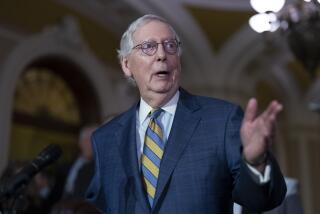No Higher Tax on Liquor Seen to Help Pay Health Care Costs
- Share via
WASHINGTON — Senate Majority Leader George J. Mitchell (D-Me.) said Sunday that he doubts Congress will go along with a higher tax on distilled liquor to help pay for health care reforms.
The Clinton Administration is considering taxes on both tobacco and distilled liquor--other than beer and wine--to raise between $12 billion and $16 billion a year to help pay for health care for low-income and uninsured Americans.
Mitchell, appearing on NBC’s “Meet the Press,” said he favors a tobacco tax but that he is opposed to the proposed liquor tax because Congress only three years ago increased the excise tax on liquor.
“I don’t think there will be any increase on the tax on alcohol in any form,” Mitchell said.
Although some members of the Administration’s health care task force have suggested a tax of up to $2 a pack on cigarettes, the White House is currently leaning toward a more modest tobacco tax of about 50 cents per pack, officials said. Mitchell said that the additional tax on cigarettes “will be sufficient for what is needed.”
As part of a deficit-reduction package, Congress in 1990 increased the federal alcohol excise tax by $1 per gallon of 100-proof liquor, 16 cents per six pack of beer and 21 cents per gallon of wine. The tax on cigarettes also was increased by 8 cents a pack.
More to Read
Get the L.A. Times Politics newsletter
Deeply reported insights into legislation, politics and policy from Sacramento, Washington and beyond. In your inbox three times per week.
You may occasionally receive promotional content from the Los Angeles Times.









